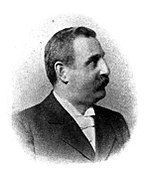Immanuel Munk, Date of Birth, Place of Birth, Date of Death
TweetImmanuel Munk
German physiologist
 Date of Birth: 30-May-1852
Date of Birth: 30-May-1852
 Place of Birth: Poznań, Greater Poland Voivodeship, Poland
Place of Birth: Poznań, Greater Poland Voivodeship, Poland
Date of Death: 01-Aug-1903
Profession: physician, physiologist
Nationality: German Empire
Zodiac Sign: Gemini 
About Immanuel Munk
- Immanuel Munk (30 May 1852, Posen – 1 August 1903, Berlin) was a German physiologist.
- He was the younger brother of physiologist Hermann Munk (1839–1912). He studied medicine at the Universities of Berlin, Breslau, and Strasbourg, obtaining his doctorate in 1873 with the thesis Versuche über die Wirkung des Kryptopins.
- At Berlin, his influences included pharmacologist Oskar Liebreich and chemist Ernst Leopold Salkowski.
- In 1883, he began work as a lecturer in physiology and physiological chemistry, and from 1895, he was an associate professor to the Faculty of Medicine in Berlin.
- In 1899, he attained a full professorship.His research primarily dealt with issues pertaining to nutrition, metabolism, urinary secretions, and the absorption/formation of animal body fat, to name a few.
- His scientific papers appeared mainly in "Virchows Archiv", "Pflüger's Archiv", and in the physiological division of the "Archiv für Anatomie und Physiologie".
- In 1897, he became editor of the periodical Centralblatt für Physiologie.
Read more at Wikipedia
See Also
- Famous People's Birthdays on 30 May, Poland
- Famous People's Birthdays in May, Poland
- Famous People's Birthdays on 30 May, German Empire
- Famous People's Birthdays in May, German Empire
- Famous physician's Birthdays on 30 May, Poland
- Famous physician's Birthdays in May, Poland
- Famous physiologist's Birthdays on 30 May, Poland
- Famous physiologist's Birthdays in May, Poland
- Famous physician's Birthdays on 30 May, German Empire
- Famous physician's Birthdays in May, German Empire
- Famous physiologist's Birthdays on 30 May, German Empire
- Famous physiologist's Birthdays in May, German Empire

